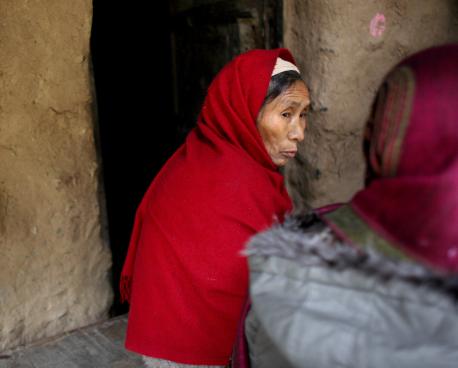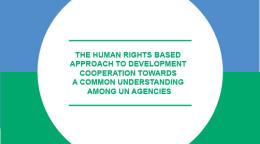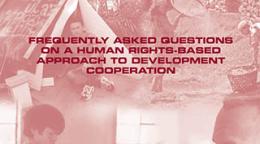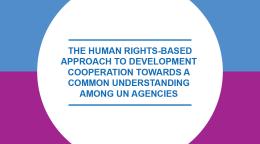Universal Values
Principle One: Human Rights-Based Approach
Human Rights has been central pillar of the United Nation’s work from its inception in 1945 with the adoption of the Charter of the United Nations. We can proudly celebrate having given birth to a normative era in which the international community, inspired by the Universal Declaration of Human Rights, has produced an outstanding corpus of international norms and standards for a life of dignity and well-being for all. You can read more about these achievements here.
The human rights-based approach (HRBA) is a conceptual framework for the process of human development that is normatively based on international human rights standards and operationally directed to promoting and protecting human rights. It seeks to analyse inequalities which lie at the heart of development problems and redress discriminatory practices and unjust distributions of power that impede development progress and often result in groups of people being left behind.
Under the HRBA, the plans, policies and processes of development are anchored in a system of rights and corresponding obligations established by international law, including all civil, cultural, economic, political and social rights, and the right to development. HRBA requires human rights principles (universality, indivisibility, equality and non-discrimination, participation, accountability) to guide United Nations development cooperation, and focus on developing the capacities of both ‘duty-bearers’ to meet their obligations, and ‘rights-holders’ to claim their rights.
While there’s no universal recipe for a human rights-based approach, United Nations agencies have nonetheless agreed a number of essential attributes in the 2003 Common Understanding on HRBA to Development Cooperation, which indicates that:
- All programmes of development co-operation, policies and technical assistance should further the realisation of human rights as laid down in the Universal Declaration of Human Rights and other international human rights instruments.
- Human rights standards contained in, and principles derived from, the Universal Declaration of Human Rights and other international human rights instruments guide all development cooperation and programming in all sectors and in all phases of the programming process.
- Development cooperation contributes to the development of the capacities of ‘duty-bearers’ to meet their obligations and/or of ‘rights-holders’ to claim their rights.
The Universal Human Rights Index is a tool designed to facilitate access to human rights recommendations issued by the United Nations’ human rights mechanisms, including the nine treaty bodies established under the international human rights treaties, the special procedures and the Universal Periodic Review (UPR) of the Human Rights Council. The UNSDG has produced guidance on strengthening strategic engagement with the human rights machinery.
HRBA is one of the six Guiding Principles of the United Nations Sustainable Development Cooperation Framework. The Companion Piece on the Guiding Principles provides guidance to United Nations country teams on application of the HRBA in the context of the Cooperation Framework, and other UNSDG operational and training materials on the HRBA can be found under Resources.





